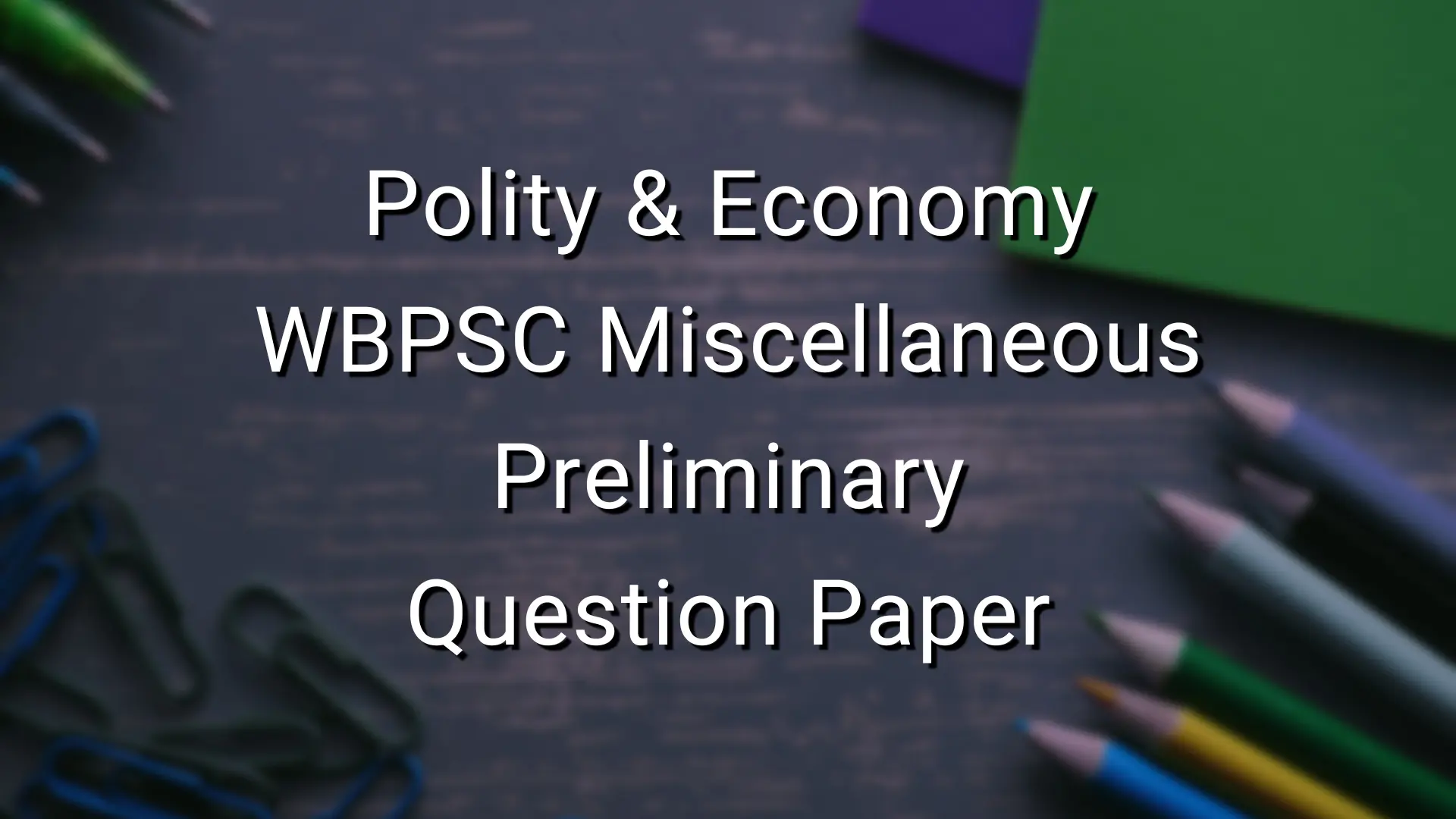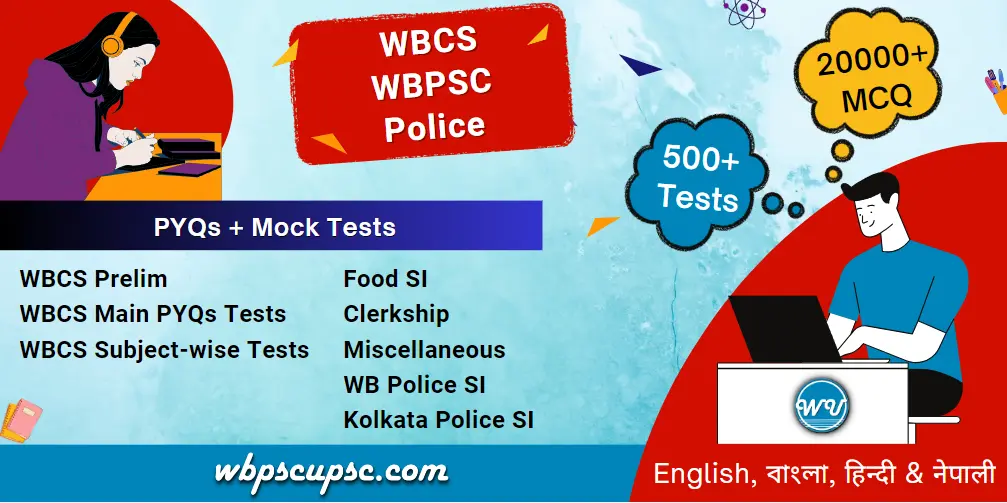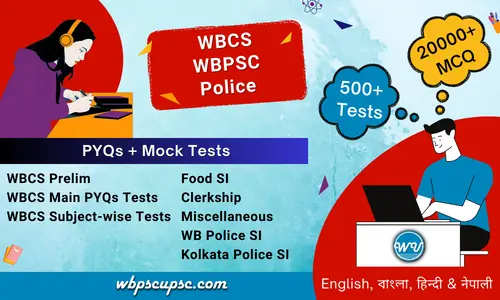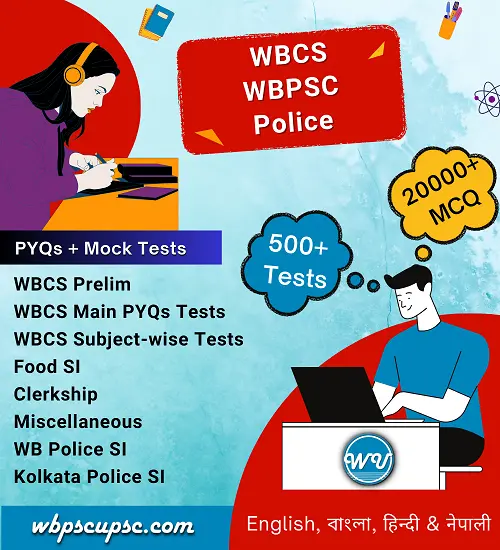Polity & Economy – WBPSC Miscellaneous Preliminary Question Paper
Contents
Polity & Economy – WBPSC Miscellaneous Question Paper

Miscellaneous Question Paper – 2019
6. According to the Constitution of India who is/are the ultimate sovereign?
(A) All elected representatives of the legislative assembly
(B) Prime Minister of India
(C) President of India
(D) All citizens of India
17. What type of citizenship is granted as per Indian Constitution?
(A) Single citizenship
(B) Dual citizenship
(C) Double citizenship for the province and the state
(D) Multiple citizenship
41. Under which Prime Minister, in which year was the voting age in the Indian Constitution was amended by reducing from 21 to 18?
(A) Indira Gandhi, 1981
(B) Rajiv Gandhi, 1989
(C) Narsimha Rao, 1992
(D) Atal Bihari Vajpayee, 1998
43. Which Article of the Indian Constitution is related to ‘Abolition of Untouchability’?
(A) Article 17
(B) Article 18
(C) Article 19
(D) Article 20
45. Which following artist had taken the responsibility of designing the layout of the first Indian Constitution?
(A) Jamini Roy
(B) Nandalal Bose
(C) Amrita Shergil
(D) Ganesh Pyne
47. Which right below no longer falls under the Fundamental Rights in Indian Constitution?
(A) Right to Education
(B) Right to Religious Freedom
(C) Right to Equality
(D) Right to Property
59. What does Article 23 of Indian Constitution proclaim?
(A) Prohibition of religious imposition
(B) Prohibition of traffic in human beings
(C) Prohibition of forest animal killings
(D) None of the above
Miscellaneous Question Paper – 2018
26. The concept ‘secularism’ was incorporated into the Preamble of the Constitution of India by
(A) 42nd Amendment
(B) 44th Amendment
(C) 1st Amendment
(D) 23rd Amendment
27. The concept social justice is an integral part of the
(A) Fundamental duties under Constitution
(B) Preamble to the Constitution
(C) Article 12 of the Constitution
(D) Right to religion under Constitution
28. “Basic structure” doctrine has been declared by the Supreme Court in
(A) Ajay Hasia Case
(B) R. D. Shetty Case
(C) Keshavananda Bharati Case
(D) Valsama Case
29. The “right to know” is protected under the Constitution of India
(A) Article 14
(B) Article 19(1)(c)
(C) Article 20(1)
(D) Article 19(1)(a)
30. “Women and Children” are protected under the Constitution of India in
(A) Article 15(3)
(B) Article 14(1)
(C) Article 22(8)
(D) Article 15(1)
31. The President shall be elected by the
(A) Member of Electoral College
(B) Member of Lok Sabha
(C) Member of Assemblies
(D) None of the above
39. By which Constitutional Amendment GST has been introduced in India?
(A) 100th Amendment
(B) 105th Amendment
(C) 99th Amendment
(D) 101st Amendment
40. Anti-defection law under the Constitution of India is elaborated in
(1985, 52nd Amendment )
(A) 10th Schedule
(B) 9th Schedule
(C) 8th Schedule
(D) 7th Schedule
Miscellaneous Question Paper – 2012 (S-1)
- What is the maximum gap allowed between two parliamentary sessions?
(A) Four months
(B) Three months
(C) Six months
(D) Six weeks
- The Constituent Assembly was formed on the basis
(A) Cripps Mission, 1942
(B) Wavell Plans, 1945
(C) Cabinet Mission Plan, 1946
(D) Mountbatten Plan, 1947
- Which is the only union territory to have its own Court ?
(A) Andaman and Nicobar Islands
(B) Daman and Diu
(C) Delhi
(D) Lakshadweep
- What is the main function of the Finance Commission ?
(A) Reviewing of National Plan from time to time
(B) Distribution of revenues between Union and States
(C) Inquiring into and advising upon disputes arising between two States.
(D) Formulation of Plans for all round development
- Why are Fundamental Rights different from Directive Principles?
(A) Fundamental Rights are not bindings upon States and its agencies
(B) Fundamental Rights are enforceable in Courts of Law and Directive Principles are not
(C) Directive Principles are enforceable in Courts of Law and Fundamental Rights are not
(D) Directive Principles are binding upon States
- The words ‘Secular’ and ‘Socialist’ has been added to the Preamble by which amendment ?
(A) 45th amendment, 1980
(B) 42nd amendment, 1976
(C) 44th amendment, 1978
(D) 43rd amendment, 1977
- What is the average rate of growth of the Indian economy during the 11th Plan Period ?
(A) 7%
(B) 7.5%
(C) 8%
(D) 8.5%
- Who is known as the father of White Revolution in India
(A) Verghese Kurien
(B) M. S. Swaminathan
(C) P. G. Bantol
(D) Sam Pitroda
Miscellaneous Question Paper – 2012 (S-2)
7. The petroleum price in India was completely deregulated according to the recommendations
of which committee?
(A) Kirit Parekh Committee
(B) Y. K. Alagh Committee
(C) Satish Chandra Committee
(D) Rakesh Mohan Committee
61. Which Parliamentary Committee considers matters of procedure and conduct of business?
(A) The Rules Committee
(B) Business Advisory Committee
(C) Ad Hoc Committees
(D) Financial Committees
65. The Supreme Court consists of
(A) One Chief Justice and 18 other Judges
(B) One Chief Justice and 25 other Judges
(C) One Chief Justice and 26 other Judges
(D) One Chief Justice and 30 other Judges
69. Article 309 empowers Parliament and State Legislatures
(A) To regulate the recruitment and conditions of service of the Public Services of the Union and the States respectively
(B) To deal with powers and duties of the Comptroller and Auditor General
(C) To deal with Indian Foreign Service
(D) To regulate Income-Tax Officers (Class I) Service
73. When can ordinances be issued by the President?
(A) When Parliament is not in session
(B) During emergency
(C) When Parliament is in session
(D) None of the above
77. Article 14 of the Constitution of India ensures ___
(A) Equality before the law and equal protection of the laws
(B) Right to freedom
(C) Right to religion
(D) Right to constitutional remedies
80. The Muslim Brotherhood is the political organisation of which country?
(A) Tunisia
(B) Egypt
(C) Libya
(D) Saudi Arabia
81. Right to Freedom is ensured in the Indian Constitution under Article___
(A) 23
(B) 25
(C) 18
(D) 19
Miscellaneous Question Paper – 2011
- Article 25 of the Constitution of India deals with
(A) Right to Equality
(B) Right to Freedom
(C) Right to Religion
(D) Right against Exploitation
- By which amendment, the 9th Schedule has been introduced in the Constitution of India?
(A) 1st Amendment
(B) 3rd Amendment
(C) 10th Amendment
(D) 14th Amendment
- Under which provision of the Indian Constitution Union can protect the State against external aggression and internal disturbance?
(A) Article 355
(B) Article 356
(C) Article 359
(D) Article 360
- The impact of Green Revolution in India was felt most in case of?
(A) Rice
(B) Wheat
(C) Oil seeds
(D) Jute
- Under which Article of Constitution of India a citizen can go to the Supreme Court for the protection of his Fundamental Rights?
(A) Article 5
(B) Article 226
(C) Article 32
(D) Article 356
- How many Fundamental Duties have been incorporated in the Constitution?
(A) Five
(B) Seven
(C) Ten
(D) Eleven
- How many Fundamental Rights have been incorporated in the Constitution of India?
(A) Six
(B) Four
(C) Seven
(D) Nine
Miscellaneous Question Paper – 2010
- To uphold and protect the sovereignty, unity and integrity of India is
(A) a directive principle of state policy
(B) an Act of Parliament
(C) a fundamental duty
(D) a directive of the Supreme Court of India
- The President of India can be removed from his post on the ground of:
(A) anti-state activity
(B) dishonesty
(C) violation of the Constitution
(D) inefficiency in work
- The Indian Parliament consists of
(A) Lok Sabha and Rajya Sabha
(B) President, Lok Sabha and Rajya Sabha
(C) President, Lok Sabha, Rajya Sabha and Chief Election Commissioner
(D) Lok Sabha, Rajya Sabha and Chief Justice of India
- The joint sitting of the Parliament is presided by
(A) the President of India
(B) the Prime Minister of India
(C) the Chairman of the Rajya Sabha
(D) the Speaker of the Lok Sabha
- The link between the President and the Lok Sabha is
(A) the Prime Minister
(B) the Speaker of the Lok Sabha
(C) the Chairman of Rajya Sabha
(D) the Minister for Parliamentary Affairs
- The Panchayat in West Bengal at present consists of
(A) Gram Panchayat, Anchal Panchayat and Zila Parishad
(B) Gram Sabha, Anchalik Parishad and Zilla Parishad
(C) Gram Panchayat, Anchalik Parishad and Zilla Parishad
(D) Gram Panchayat, Panchayat Samiti and Zila Parishad.



